 Petzlover
PetzloverChart Polski is originated from Poland but Moscow Water Dog is originated from Russia. Both Chart Polski and Moscow Water Dog are having almost same height. Chart Polski may weigh 23 kg / 50 pounds lesser than Moscow Water Dog. Both Chart Polski and Moscow Water Dog has same life span. Chart Polski may have less litter size than Moscow Water Dog. Chart Polski requires Low Maintenance. But Moscow Water Dog requires Moderate Maintenance
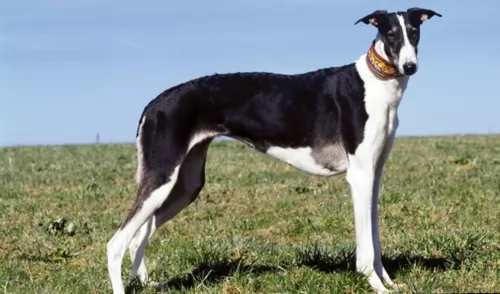 The Chart Polski dog is a member of the Greyhound family and comes from Poland. He is an old dog breed dating way back to the 1600s.
The Chart Polski dog is a member of the Greyhound family and comes from Poland. He is an old dog breed dating way back to the 1600s.
The dog also goes by other names such as the Polish Sighthound and the Polish Greyhound. The dog looks quite similar to the English Greyhound and has been used as a hunting dog. With his exceptional speed, he has been able to run down prey.
The Chart Polski has always been seen in privileged classes, and after dying out to some extent, it became popular again in the 1970s. It is looked upon as a companion dog essentially while also still being used for hunting in Poland.
Today, the Polish Kennel Club as well as the Federation Cynologique Internationale, and the United Kennel Club recognize the breed.
The Moscow Water Dog was developed in the Soviet Union around the same time as other classic Soviet dogs. The Moscow Watchdog and the Black Russian Terrier are a couple of these other dogs. The Water Dog came from crossing the Caucasian Oytcharka with the Newfoundland. The breed is known by many names including the Vodolaz which means “diver of deep Water”. The Moscow Water Dog was only bred in the Russian state’s Red Star Kennels as working dogs for the military.
Following the second World War, most of the working dogs had been destroyed during the war. Not enough dogs could be imported to begin a breeding program for any working breed. So, the Soviet Red Star Kennels began to create several working breeds. Included in this group with the Moscow Water Dog, were the Moscow Newfoundland, the Moscow Great Dane, the Black Russian Terrier, and the Brudasty Hound.
The only really successful breed coming from this program is the Russian Black Terrier. All the rest are either extinct or found only in Russia today. The Moscow Water Dog was supposed to be a life saver/water rescue dog, but the dogs they developed were too aggressive, and the program was scrapped. It seemed that the cross had bred a dog that had too much of the working water dog traits and not enough of the rescue dog traits. The military breeders tried to pass the dogs off as a Russian Newfoundland and sell it to the non-military.
These non-military owners of the few “Russian Newfoundland”, did not try to change the dogs through breeding. Instead over time they bred the Russian Newfoundland with pure bred Newfoundlands almost eliminating the “Russian” portion of the breed. By the early 1980’s the stock had been so diluted with the pure Newfoundland that the Russian Newfoundland was basically extinct.
The Red Army kennel had other breeds with some of the genes of this breed in their lines. This included the Brudasty Hound, the Moscow Great Dane, the Caucasian Oycharka, the Moscow Watchdog and the Russian Black Terrier. The Russian Navy was unhappy with the situation and never again let the army developed the Navy’s waterdog.
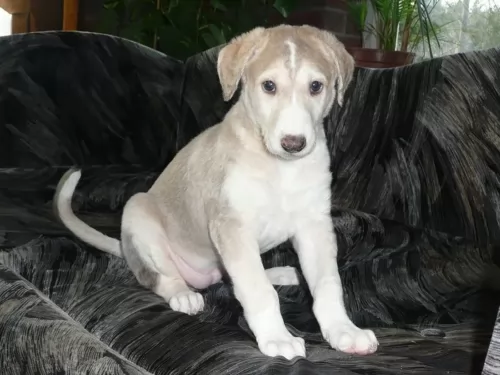 The Chart Polski looks similar to other sighthound breeds, and is a large breed, standing at between 68-80cm and weighing between 26 and 32kg. He is well muscled, slender and lean.
The Chart Polski looks similar to other sighthound breeds, and is a large breed, standing at between 68-80cm and weighing between 26 and 32kg. He is well muscled, slender and lean.
The face is typically long and narrow, although the muzzle is somewhat blunter than most sighthounds. His coat is short and sleek and can be in colors such as white, tan, black or a combination of these. His eyes are large and dark brown, the ears medium sized and narrow and usually folded back while the tail is long and curved at the tip.
The Chart Polski’s temperament is somewhat different to most sighthounds and he is thought to be more gentler and evenly tempered. He is loving and affectionate and will form a close bone with his human family.
He is confident, stubborn and strong-willed, and because he has been used for hunting, he has also got some aggressive tendencies towards other animals. He will need training and socialization to ensure he is good around other pets in the home as well as with children.
He becomes obedient and responsive with this training and socialization. He is a territorial breed, being protective around what he considers his own property and will make a good watchdog.
The Moscow Water Dog was intelligent, vigilant, an excellent swimmer, and great in artic waters. However, he was too aggressive and instead of saving the swimmer, they would attack them. The Moscow Water Dog is a tall, balanced and powerful dog. They have a wide muzzle and a square head like the Newfoundland. Their eyes are dark and small while the ears are triangular. The nose and lips are black. He has webbed feet of course and a hanging tail.
The coat on the Moscow Water Dog was of course waterproof and double. The top coat is very dense, straight and soft. It is usually a dark brown with some black and white.
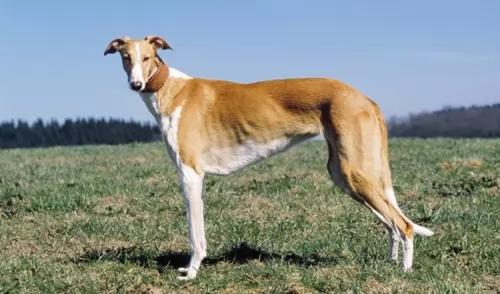 Your Chart Polski or Polish Greyhound promises to be a loving, devoted pet that fits in well to a family that will give him good exercise and look after him well.
Your Chart Polski or Polish Greyhound promises to be a loving, devoted pet that fits in well to a family that will give him good exercise and look after him well.
He isn’t as gentle as other hounds and can therefore make a good watchdog too. He is territorial and wants to protect all those he regards as his own.
Train him and socialize him, and you will see that this intelligent, independent and self-confident dog can become obedient and also relaxed around people as well as other pets in the home, making him a splendid pet for those who admire these tall, slender dogs.
yes
Swimming and stamina
Yes but needed some land. Better in countryside.
This is an intelligent dog, but he could not be trained out of his aggressiveness.
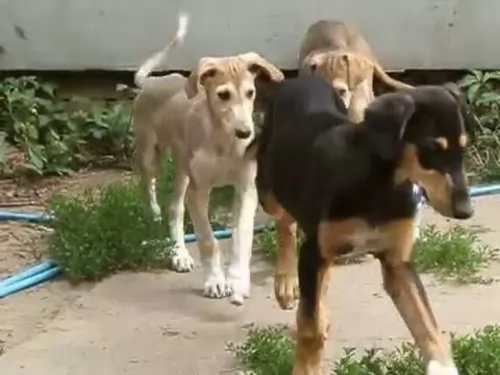 The Chart Polski can live to be 10 – 12 years when he gets his full quota of care in terms of good diet, exercise, love and care and a nice dry, warm place to sleep.
The Chart Polski can live to be 10 – 12 years when he gets his full quota of care in terms of good diet, exercise, love and care and a nice dry, warm place to sleep.
He isn’t known to have any specific health issues that could shorten his life, but by knowing about some of the common dog ailments there are, you can watch your pet and even prevent some risks.
People often think that bad teeth can’t do much harm, but tartar build-up can progress to gum disease, to the roots of the teeth and to damaging other parts of the body such as kidney-, liver- and heart.
Bacterial and viral infections are a threat to any dog, and rabies and parvo for instance can take your pet’s life. Remember that terrible diseases such as these can be prevented through having your dog vaccinated.
Dogs are open to getting all kinds of parasites inside- as well as outside on the skin. Hookworm, roundworm, fleas and ticks are examples of these parasites that can get into your pet’s system through dirty food,water and bites from mosquitoes. Some of these parasites can even be transmitted to you.
If your pet is in any way run down, get him to a vet immediately as there is an effective treatment.
Because the breed was around for such a short period there is not a lot of documentation or information regarding genetic or propensity health issues. There are however a few issues that just his heritage and Newfoundland blood would lend itself to.
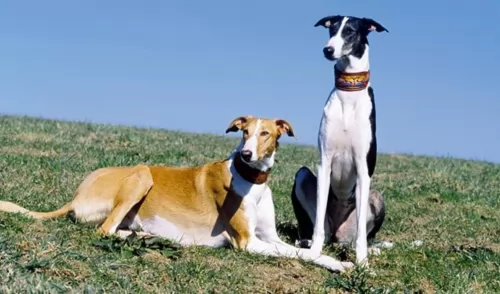 The Chart Polski was bred as a hunting dog and to run at top speed to bring down its prey. Today, he is tall and lean and still loves to run, and will therefore require a good deal of exercise.
The Chart Polski was bred as a hunting dog and to run at top speed to bring down its prey. Today, he is tall and lean and still loves to run, and will therefore require a good deal of exercise.
Don’t let his slender build deceive you because he is powerful and will need a walk every day and be given the opportunity to run. He will happily accompany you when you go running or cycling. Left un-exercised, he will become frustrated and aggressive and even destructive, so as a responsible dog owner, it is up to you to ensure he is well exercised.
The Chart Polski is a large breed puppy and they tend to grow fast at first. You want to make sure that he doesn’t put on weight too quickly as this puts them at risk for skeletal development problems later on such as hip- and elbow dysplasia. Speak to your veterinarian about feeding your puppy correctly so that he grows slowly, allowing his bones and joints to develop strongly and healthily.
Your adult Chart Polski will also need a special diet that caters for his size and energy levels. Remember to include some raw meat into his diet occasionally as well, as this will help him steer clear of dry, allergic skin conditions. Always ensure that he has access to fresh, cool water.
As a hunting dog, you’ll find the Chart Polski to require little grooming. No trimming or stripping is required for his short coat and you’ll simply need to brush him down twice a week.
Required high quality food made specifically for large or giant puppies. Feed 3-4 times a day a total of 21/2 -3 cups.
Required high quality food made for large or giant dog breeds. Feed twice a day a total of 2 cups.
The Moscow Water Dog did not need a high level of exercise, but they did have a lot of stamina. They loved to swim. Not overly active – more of a couch potato.